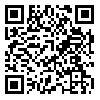مجله رویش روانشناسی از دادن گواهیهای کاغذی معذور است. لطفا تقاضا نکنید. همه گواهی ها در صفحه شخصی کاربران موجود است.
year 13, Issue 8 (automn 2024)
Rooyesh 2024, 13(8): 171-180 |
Back to browse issues page
Download citation:
BibTeX | RIS | EndNote | Medlars | ProCite | Reference Manager | RefWorks
Send citation to:



BibTeX | RIS | EndNote | Medlars | ProCite | Reference Manager | RefWorks
Send citation to:
Najafi K, Kachooei M, Bastami Katuli M. (2024). Structural model of self-ambivalence and reassurance-seeking with obsessive beliefs with the mediating role of fear of self. Rooyesh. 13(8), 171-180.
URL: http://frooyesh.ir/article-1-5275-en.html
URL: http://frooyesh.ir/article-1-5275-en.html
1- PhD Student of Clinical Psychology, Department of Clinical Psychology, University of Science and Culture, Tehran, Iran.
2- Assistant Professor, Department of Psychology, Faculty of Humanities, University of Science and Culture, Tehran, Iran. ,kachooei.m@usc.ac.ir
3- PhD in Health Psychology, Department of Psychology, University of Tehran, Tehran, Iran.
2- Assistant Professor, Department of Psychology, Faculty of Humanities, University of Science and Culture, Tehran, Iran. ,
3- PhD in Health Psychology, Department of Psychology, University of Tehran, Tehran, Iran.
Abstract: (1268 Views)
This research was conducted to investigate the mediating role of fear of self in the relationship between self-ambivalence and reassurance-seeking with obsessive beliefs. The current research was a descriptive-correlation type of structural equation modeling. The statistical population of the research was all the women of Tehran in 2023. Using the available sampling method, a sample of 447 people was selected and participated in the study. Research tools included the obsessive Beliefs Questionnaire (OBQ, Obsessive Compulsive Cognitions Working Group, 2001), the Self-Ambivalence Questionnaire (SAQ, Bhar & Kyrios, 2007), Covert and Overt reassurance-seeking inventory (CORSI, Radomsky & et al, 2020) and Fear of Self Questionnaire (FSQ, Aardema & et al, 2013). The data were analyzed using the structural equation analysis method. The results of the structural equation analysis indicated the appropriate fit of the model. The findings showed that self-ambivalence and reassurance-seeking were able to directly predict obsessive beliefs (p< 0.001). Also, self-ambivalence and reassurance-seeking could indirectly predict obsessive beliefs through fear of self (p< 0.001). These results show that self-ambivalence and reassurance-seeking, considering the important role of fear of self, can explain obsessive beliefs and it is necessary to pay attention to these factors in interaction with each other in programs to reduce obsessive beliefs.
Type of Article: Research |
Subject:
Psychoanalysis- Analytical psychology
Received: 2024/04/7 | Accepted: 2024/04/22 | ePublished: 2024/11/30
Received: 2024/04/7 | Accepted: 2024/04/22 | ePublished: 2024/11/30
Send email to the article author
| Rights and permissions | |
 |
This work is licensed under a Creative Commons Attribution-NonCommercial 4.0 International License. |





